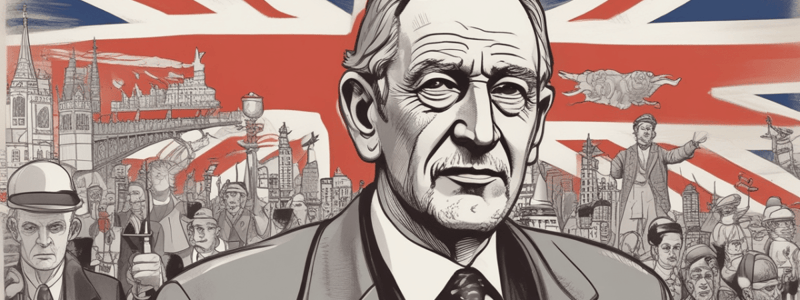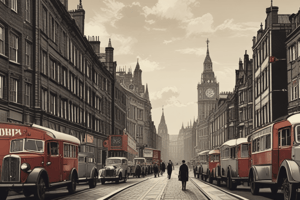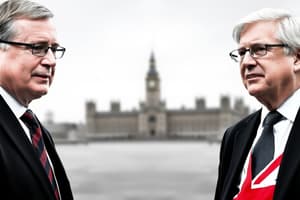Podcast
Questions and Answers
What was the primary reason for the Conservative party's defeat in the 1945 general election?
What was the primary reason for the Conservative party's defeat in the 1945 general election?
- Lack of support for the Welfare State
- The party's appeasement policy before the war (correct)
- Churchill's unpopularity
- The Labour party's strong campaign promises
What was the main goal of the Labour party's economic planning based on Keynesian economics?
What was the main goal of the Labour party's economic planning based on Keynesian economics?
- Facilitating economic growth and development through active state intervention (correct)
- Promoting free market ideology
- Reducing government expenditure
- Encouraging private investment
What was the primary focus of the nationalisation policy implemented by the Labour government from 1945 to 1951?
What was the primary focus of the nationalisation policy implemented by the Labour government from 1945 to 1951?
- Small-scale businesses
- Core or central industries and businesses (correct)
- Agricultural industries
- Financial institutions
What was the main feature of the National Health Service introduced in 1948?
What was the main feature of the National Health Service introduced in 1948?
What was the primary goal of the Labour party's Welfare State programme?
What was the primary goal of the Labour party's Welfare State programme?
What was the primary reason for the decline of British trade with former colonies?
What was the primary reason for the decline of British trade with former colonies?
What was the outcome of the 'Winter of Discontent' in 1978-79?
What was the outcome of the 'Winter of Discontent' in 1978-79?
What was the impact of World War 2 on British society?
What was the impact of World War 2 on British society?
What was the primary cause of the emergence of a multicultural society in Britain?
What was the primary cause of the emergence of a multicultural society in Britain?
What was the result of the decline of traditional heavy industries in Britain?
What was the result of the decline of traditional heavy industries in Britain?
What was the primary characteristic of the Era of Consensus between 1945 and 1970?
What was the primary characteristic of the Era of Consensus between 1945 and 1970?
What was the outcome of the Suez Crisis in 1956?
What was the outcome of the Suez Crisis in 1956?
What was the primary reason for Britain's loss of competitiveness in the 1970s?
What was the primary reason for Britain's loss of competitiveness in the 1970s?
What was the outcome of the decolonization process in the wake of the Suez Crisis?
What was the outcome of the decolonization process in the wake of the Suez Crisis?
What was the nickname given to Britain in the 1970s?
What was the nickname given to Britain in the 1970s?
The Labour Party dominated in office after 1945.
The Labour Party dominated in office after 1945.
The British government’s initial policy after the war was to maintain a policy of neutrality.
The British government’s initial policy after the war was to maintain a policy of neutrality.
The British industries were rebuilt from scratch after the war.
The British industries were rebuilt from scratch after the war.
The Suez Crisis in 1956 marked the beginning of Britain’s status as an independent great power.
The Suez Crisis in 1956 marked the beginning of Britain’s status as an independent great power.
The French referred to Britain as the ‘Sick Man of Europe’ in the 1950s.
The French referred to Britain as the ‘Sick Man of Europe’ in the 1950s.
Clement Attlee was a Liberal politician before the war.
Clement Attlee was a Liberal politician before the war.
The Conservative party was thrown out of office in 1945 due to its appeasement policy before the war.
The Conservative party was thrown out of office in 1945 due to its appeasement policy before the war.
The National Health Service introduced in 1948 provided 'free' health care only for the working class.
The National Health Service introduced in 1948 provided 'free' health care only for the working class.
The Labour government's nationalisation policy from 1945 to 1951 focused on the take-over of only small-scale industries.
The Labour government's nationalisation policy from 1945 to 1951 focused on the take-over of only small-scale industries.
The National Insurance Act of 1946 provided unemployment benefit only for the elderly.
The National Insurance Act of 1946 provided unemployment benefit only for the elderly.
The Winter of Discontent in 1978-79 led to a significant improvement in British industrial production.
The Winter of Discontent in 1978-79 led to a significant improvement in British industrial production.
British trade with the former colonies increased significantly after the 1960s.
British trade with the former colonies increased significantly after the 1960s.
The post-war Welfare State was primarily built on the foundation of individualism and consumerism.
The post-war Welfare State was primarily built on the foundation of individualism and consumerism.
The emergence of a multicultural society in Britain was primarily due to immigration from the European continent.
The emergence of a multicultural society in Britain was primarily due to immigration from the European continent.
The decline of traditional heavy industries in Britain led to a decline in wealth for the middle classes.
The decline of traditional heavy industries in Britain led to a decline in wealth for the middle classes.
Match the following social problems with the industries that led to them:
Match the following social problems with the industries that led to them:
Match the following characteristics of post-war British society with the correct description:
Match the following characteristics of post-war British society with the correct description:
Match the following events with their corresponding time period:
Match the following events with their corresponding time period:
Match the following groups with their corresponding percentage of the British population:
Match the following groups with their corresponding percentage of the British population:
Match the following phrases with their corresponding descriptions:
Match the following phrases with their corresponding descriptions:
Flashcards are hidden until you start studying
Study Notes
Post-War Britain
- Labour party wins landslide victory in 1945 general election, winning a majority in the House of Commons for the first time
- Labour's comprehensive political programme includes building the Welfare State and implementing economic planning based on Keynesian economics
The Welfare State
- Established through a series of policies and laws, the Welfare State aimed to provide a universal security network for the entire population, independently of means
- Key measures include:
- National Insurance Act of 1946, providing unemployment benefit
- National Health Service of 1948, providing 'free' healthcare for everyone
- Large-scale government building programme to provide housing at a reasonable cost (1945-51)
Economic Planning and Nationalisation
- Economic planning focused on an 'expansionist' approach, with the state intervening actively in the market to facilitate economic growth and development through expenditure and regulations
- Nationalisation of key industries, including:
- Bank of England
- Coal
- Railways
- Gas
- Electricity
- Long-distance transport
- Steel (1945-51)
Era of Consensus
- Agreement between Labour and Conservative parties on main policy pillars from 1945 to roughly 1970
- Labour moved to the right, accepting a society of inequality and giving up socialism in favour of social democracy
- Conservatives moved to the left, accepting the Welfare State, full employment, and the mixed economy
Foreign Relations
- Britain aimed to retain great power status alongside the US and Soviet Union
- Massive military expenditure, including nuclear deterrent and military presence in the Far East
- Uneasy 'special relationship' with the US, including joining the US in the Cold War and being a founding member of NATO
- Decolonisation, including:
- British India gaining independence in 1947 and dividing into India and Pakistan
- Suez Crisis in 1956, marking the end of Britain's status as an independent great power
- Liquidation of the British Empire and replacement with the Commonwealth
Economic Development
- Britain's economy was the largest in Europe well into the 1950s
- However, underlying structural problems were not addressed, and British industry gradually declined, losing competitiveness
- France referred to Britain as the 'Sick Man of Europe' by the 1970s due to:
- Industry being largely intact after the war, with no need to rebuild from scratch
- Complacency towards renewal, leading to outdated equipment and facilities
- Poor industrial relations, with strong trade unions resisting change
- British management earning a reputation for incompetence and being dominated by 'old-boys networks'
Social Development
- Economic problems led to social problems, including rising unemployment and social unrest in declining heavy industries
- Growth in the service sector led to increasing wealth for the middle classes, emerging consumer society
- Impact of WW2:
- Removed some of the worst class antagonism of pre-1939 British society and arguably helped forge cross-class solidarity
- Opened up for future individualism, consumerism, and fragmentation of society
- Emergence of a multicultural society in Britain due to large-scale immigration from former colonies, leading to a culturally more diverse Britain
Post-War Britain
- Labour party wins landslide victory in 1945 general election, winning a majority in the House of Commons for the first time
- Labour's comprehensive political programme includes building the Welfare State and implementing economic planning based on Keynesian economics
The Welfare State
- Established through a series of policies and laws, the Welfare State aimed to provide a universal security network for the entire population, independently of means
- Key measures include:
- National Insurance Act of 1946, providing unemployment benefit
- National Health Service of 1948, providing 'free' healthcare for everyone
- Large-scale government building programme to provide housing at a reasonable cost (1945-51)
Economic Planning and Nationalisation
- Economic planning focused on an 'expansionist' approach, with the state intervening actively in the market to facilitate economic growth and development through expenditure and regulations
- Nationalisation of key industries, including:
- Bank of England
- Coal
- Railways
- Gas
- Electricity
- Long-distance transport
- Steel (1945-51)
Era of Consensus
- Agreement between Labour and Conservative parties on main policy pillars from 1945 to roughly 1970
- Labour moved to the right, accepting a society of inequality and giving up socialism in favour of social democracy
- Conservatives moved to the left, accepting the Welfare State, full employment, and the mixed economy
Foreign Relations
- Britain aimed to retain great power status alongside the US and Soviet Union
- Massive military expenditure, including nuclear deterrent and military presence in the Far East
- Uneasy 'special relationship' with the US, including joining the US in the Cold War and being a founding member of NATO
- Decolonisation, including:
- British India gaining independence in 1947 and dividing into India and Pakistan
- Suez Crisis in 1956, marking the end of Britain's status as an independent great power
- Liquidation of the British Empire and replacement with the Commonwealth
Economic Development
- Britain's economy was the largest in Europe well into the 1950s
- However, underlying structural problems were not addressed, and British industry gradually declined, losing competitiveness
- France referred to Britain as the 'Sick Man of Europe' by the 1970s due to:
- Industry being largely intact after the war, with no need to rebuild from scratch
- Complacency towards renewal, leading to outdated equipment and facilities
- Poor industrial relations, with strong trade unions resisting change
- British management earning a reputation for incompetence and being dominated by 'old-boys networks'
Social Development
- Economic problems led to social problems, including rising unemployment and social unrest in declining heavy industries
- Growth in the service sector led to increasing wealth for the middle classes, emerging consumer society
- Impact of WW2:
- Removed some of the worst class antagonism of pre-1939 British society and arguably helped forge cross-class solidarity
- Opened up for future individualism, consumerism, and fragmentation of society
- Emergence of a multicultural society in Britain due to large-scale immigration from former colonies, leading to a culturally more diverse Britain
Post-War Britain
- Labour party wins landslide victory in 1945 general election, winning a majority in the House of Commons for the first time
- Labour's comprehensive political programme includes building the Welfare State and implementing economic planning based on Keynesian economics
The Welfare State
- Established through a series of policies and laws, the Welfare State aimed to provide a universal security network for the entire population, independently of means
- Key measures include:
- National Insurance Act of 1946, providing unemployment benefit
- National Health Service of 1948, providing 'free' healthcare for everyone
- Large-scale government building programme to provide housing at a reasonable cost (1945-51)
Economic Planning and Nationalisation
- Economic planning focused on an 'expansionist' approach, with the state intervening actively in the market to facilitate economic growth and development through expenditure and regulations
- Nationalisation of key industries, including:
- Bank of England
- Coal
- Railways
- Gas
- Electricity
- Long-distance transport
- Steel (1945-51)
Era of Consensus
- Agreement between Labour and Conservative parties on main policy pillars from 1945 to roughly 1970
- Labour moved to the right, accepting a society of inequality and giving up socialism in favour of social democracy
- Conservatives moved to the left, accepting the Welfare State, full employment, and the mixed economy
Foreign Relations
- Britain aimed to retain great power status alongside the US and Soviet Union
- Massive military expenditure, including nuclear deterrent and military presence in the Far East
- Uneasy 'special relationship' with the US, including joining the US in the Cold War and being a founding member of NATO
- Decolonisation, including:
- British India gaining independence in 1947 and dividing into India and Pakistan
- Suez Crisis in 1956, marking the end of Britain's status as an independent great power
- Liquidation of the British Empire and replacement with the Commonwealth
Economic Development
- Britain's economy was the largest in Europe well into the 1950s
- However, underlying structural problems were not addressed, and British industry gradually declined, losing competitiveness
- France referred to Britain as the 'Sick Man of Europe' by the 1970s due to:
- Industry being largely intact after the war, with no need to rebuild from scratch
- Complacency towards renewal, leading to outdated equipment and facilities
- Poor industrial relations, with strong trade unions resisting change
- British management earning a reputation for incompetence and being dominated by 'old-boys networks'
Social Development
- Economic problems led to social problems, including rising unemployment and social unrest in declining heavy industries
- Growth in the service sector led to increasing wealth for the middle classes, emerging consumer society
- Impact of WW2:
- Removed some of the worst class antagonism of pre-1939 British society and arguably helped forge cross-class solidarity
- Opened up for future individualism, consumerism, and fragmentation of society
- Emergence of a multicultural society in Britain due to large-scale immigration from former colonies, leading to a culturally more diverse Britain
Studying That Suits You
Use AI to generate personalized quizzes and flashcards to suit your learning preferences.



